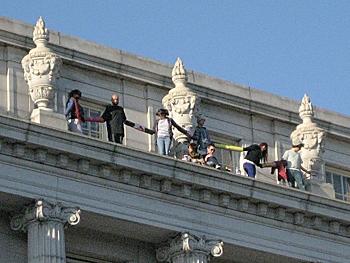NEW YORK—As Congress wrestles with whether to extend the “Cash for Clunkers” program, people are rushing to trade-in their old cars for brand new vehicles as part of the program, clogging its website on Monday.
Formally known as the Car Allowance Rebate System (CARS), the program was created to “to boost the economy, to get less fuel efficient vehicles off the road and to boost auto sales” on domestic and foreign cars, according to Karen Aldana, spokesperson for the National Highway Traffic Safety Administration (NHTSA), the agency responsible for administering the program.
The bill, allocating $1 billion to the program, was drafted by the Senate and signed into law by President Obama on June 24, 2009 and began to be implemented on July 24, Aldana said.
Under the Cash for Clunkers program, a car manufactured less than 25 years ago that gets less than 18 miles per gallon can be traded in for a discount off a brand new car of up to $4,500, depending on the type of car traded in and the difference in miles per gallon between the new and old cars, according to the program’s website.
Dealers offer customers discounts and then get reimbursed by the government, which can take up to 10 days, said Aldana. Each dealership will send in paperwork, which will be validated by the NHTSA to “safeguard against fraud and abuse” of taxpayers’ dollars, Aldana added.
The Ford Program Headquarters reported that at least 204 cars were sold since the program was launched in late July. However, since the $1 billion—enough to sell 250,000 cars—is running out, Ford will not be able to continue the program until the end of this month as promised, said a program administrator at the Ford Program Headquarters in Detroit.
Last week, a bill to extend the Cash for Clunkers program passed in the House of Representatives to allocate an additional $2 billion to the cause. The Senate is still wrestling over the continuation of the program intended to boost the economy.
The $2 billion will be taken from the $6 billion loan guarantee program that would “leverage significant investment in green energy manufacturing and production,” said Jude McCartin, spokes person for Senator Jeff Bingaman, Chairman of the U.S. Senate Committee on Energy and Natural Resources.
The spokesperson reported that Senator Bingaman holds the position that “If we extend this program, it would be best to extend it by tapping into a different fund.”
Formally known as the Car Allowance Rebate System (CARS), the program was created to “to boost the economy, to get less fuel efficient vehicles off the road and to boost auto sales” on domestic and foreign cars, according to Karen Aldana, spokesperson for the National Highway Traffic Safety Administration (NHTSA), the agency responsible for administering the program.
The bill, allocating $1 billion to the program, was drafted by the Senate and signed into law by President Obama on June 24, 2009 and began to be implemented on July 24, Aldana said.
Under the Cash for Clunkers program, a car manufactured less than 25 years ago that gets less than 18 miles per gallon can be traded in for a discount off a brand new car of up to $4,500, depending on the type of car traded in and the difference in miles per gallon between the new and old cars, according to the program’s website.
Dealers offer customers discounts and then get reimbursed by the government, which can take up to 10 days, said Aldana. Each dealership will send in paperwork, which will be validated by the NHTSA to “safeguard against fraud and abuse” of taxpayers’ dollars, Aldana added.
The Ford Program Headquarters reported that at least 204 cars were sold since the program was launched in late July. However, since the $1 billion—enough to sell 250,000 cars—is running out, Ford will not be able to continue the program until the end of this month as promised, said a program administrator at the Ford Program Headquarters in Detroit.
Last week, a bill to extend the Cash for Clunkers program passed in the House of Representatives to allocate an additional $2 billion to the cause. The Senate is still wrestling over the continuation of the program intended to boost the economy.
The $2 billion will be taken from the $6 billion loan guarantee program that would “leverage significant investment in green energy manufacturing and production,” said Jude McCartin, spokes person for Senator Jeff Bingaman, Chairman of the U.S. Senate Committee on Energy and Natural Resources.
The spokesperson reported that Senator Bingaman holds the position that “If we extend this program, it would be best to extend it by tapping into a different fund.”



